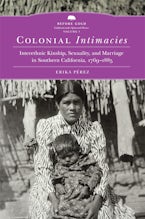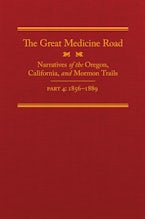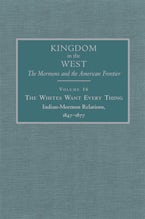- Home
- Before Gold: California under Spain and Mexico Series
- history
- social science
- Colonial Intimacies
Colonial Intimacies
Interethnic Kinship, Sexuality, and Marriage in Southern California, 1769–1885
by Erika Perez
Published by: University of Oklahoma Press
Imprint: University of Oklahoma Press
408 Pages | 6 x 9 | 20 b&w illus., 9 charts
$45.00
$39.95
“A gem of historical scholarship!”—Vicki L. Ruiz, author of From Out of the Shadows: Mexican Women in Twentieth-Century America
How do intimate relationships reveal, reflect, enable, or enact the social and political dimensions of imperial projects? In particular, how did colonial relations in late-eighteenth- and nineteenth-century southern California implicate sexuality, marriage, and kinship ties? In Colonial Intimacies, Erika Pérez probes everyday relationships, encounters, and interactions to show how intimate choices about marriage, social networks, and godparentage were embedded in larger geopolitical concerns. Her work reveals, through the lens of social and familial intimacy, subtle tools of conquest and acts of resistance and accommodation among indigenous peoples, Spanish-Mexican settlers, Franciscan missionaries, and European and Anglo-American merchants.
Concentrating on Catholic conversion, compadrazgo (baptismal sponsorship that often forged interethnic relations), and intermarriage, Pérez examines the ways indigenous and Spanish-Mexican women helped shape communities and sustained their culture. She uncovers an unexpected fluidity in Californian society—shaped by race, class, gender, religion, and kinship—that persisted through the colony’s transition from Spanish to American rule.
Colonial Intimacies focuses on the offspring of interethnic couples and their strategies for coping with colonial rule and negotiating racial and cultural identities. Pérez argues that these sons and daughters experienced conquest in different ways tied directly to their gender, and in turn faced different options in terms of marriage partners, economic status, social networks, and expressions of biculturality.
Offering a more nuanced understanding of the colonial experience, Colonial Intimacies exposes the personal ties that undergirded imperial relationships in Spanish, Mexican, and early American California.
How do intimate relationships reveal, reflect, enable, or enact the social and political dimensions of imperial projects? In particular, how did colonial relations in late-eighteenth- and nineteenth-century southern California implicate sexuality, marriage, and kinship ties? In Colonial Intimacies, Erika Pérez probes everyday relationships, encounters, and interactions to show how intimate choices about marriage, social networks, and godparentage were embedded in larger geopolitical concerns. Her work reveals, through the lens of social and familial intimacy, subtle tools of conquest and acts of resistance and accommodation among indigenous peoples, Spanish-Mexican settlers, Franciscan missionaries, and European and Anglo-American merchants.
Concentrating on Catholic conversion, compadrazgo (baptismal sponsorship that often forged interethnic relations), and intermarriage, Pérez examines the ways indigenous and Spanish-Mexican women helped shape communities and sustained their culture. She uncovers an unexpected fluidity in Californian society—shaped by race, class, gender, religion, and kinship—that persisted through the colony’s transition from Spanish to American rule.
Colonial Intimacies focuses on the offspring of interethnic couples and their strategies for coping with colonial rule and negotiating racial and cultural identities. Pérez argues that these sons and daughters experienced conquest in different ways tied directly to their gender, and in turn faced different options in terms of marriage partners, economic status, social networks, and expressions of biculturality.
Offering a more nuanced understanding of the colonial experience, Colonial Intimacies exposes the personal ties that undergirded imperial relationships in Spanish, Mexican, and early American California.
Erika Pérez is Associate Professor of History, and Affiliated Faculty in Gender and Women’s Studies, at the University of Arizona, Tucson.
“With careful documentation, nuance, and corazón, Erika Pérez brings fresh perspectives to the study of colonialism’s reflection in the day-to-day—how gendered bonds of intimacy cut across race, ethnicity, class, and generation. In this account, indigenous women are actors in their own right, especially in their relationships with Spanish-Mexican women who were both conquerors and comadres. A gem of historical scholarship!”—Vicki L. Ruiz, author of From Out of the Shadows: Mexican Women in Twentieth-Century America
“Erika Pérez tells a not-so-familiar story of how the most intimate of human relations could grease the wheels of California’s successive colonialisms, grind them to a halt, or send them spinning in new directions. Colonial Intimacies is the result of staggering research in a wide range of primary sources covering more than a century in the lives of Spanish-Mexican, Indigenous, and bicultural peoples. Full of sumptuous detail and insight into the most quotidian aspects of a colonial world, it interrogates fully both accommodating and resistant responses to colonialism. California history won’t ever be the same.”—Susan Lee Johnson, author of Roaring Camp: The Social World of the California Gold Rush












